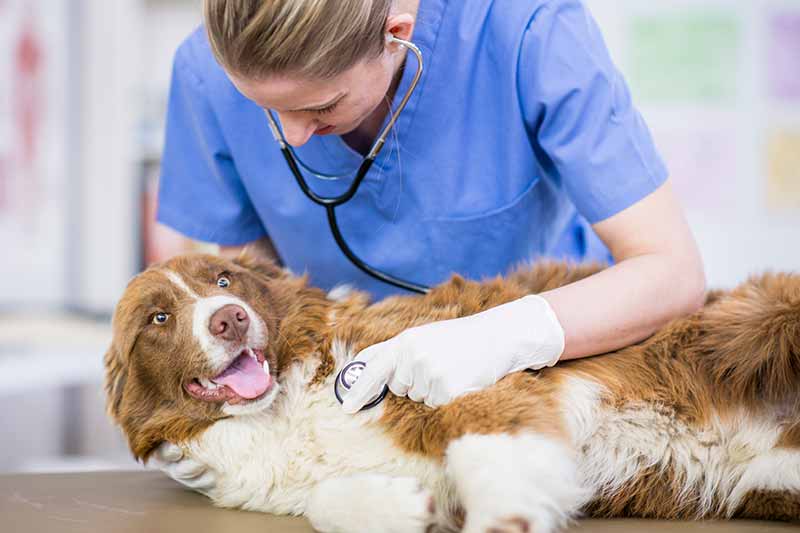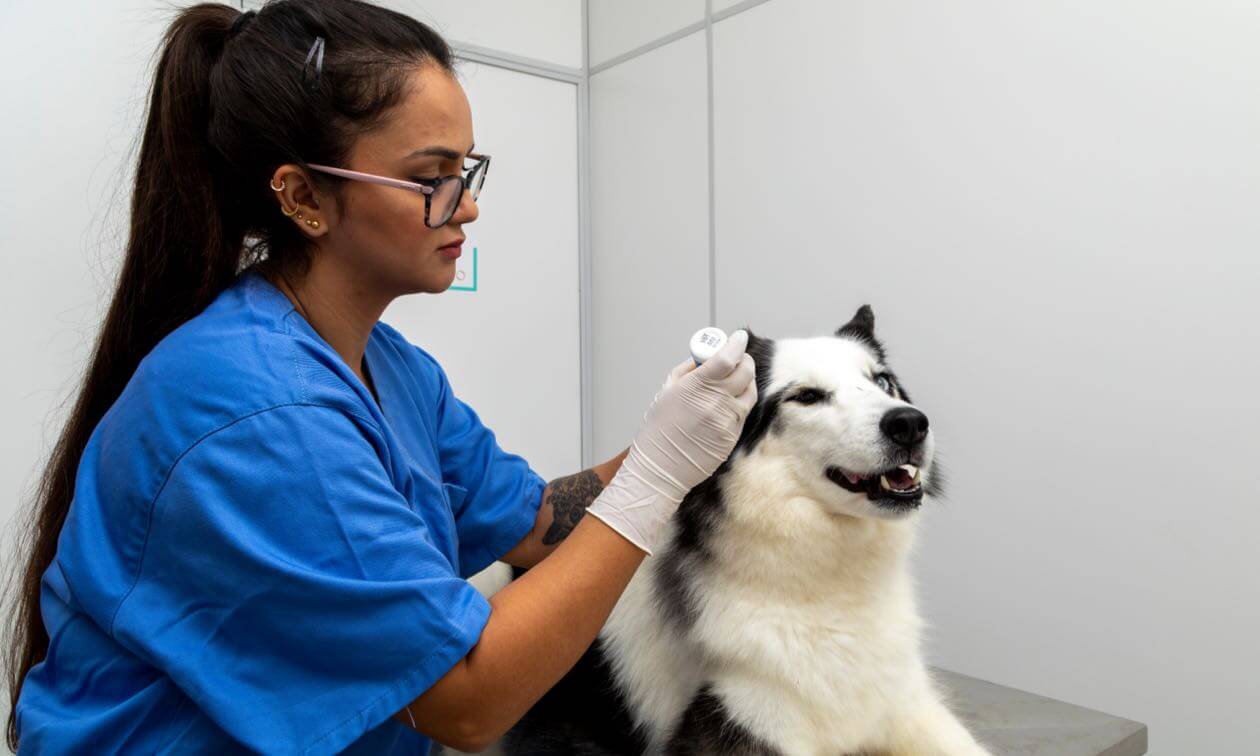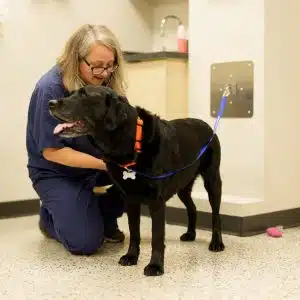Comprehensive Overview to the Solutions Supplied by a Vet Oncologist
Veterinary oncology includes a broad array of solutions aimed at identifying and dealing with cancer in pets. Veterinary Oncologist. Oncologists utilize sophisticated analysis methods and offer different treatment choices tailored per pet's requirements. They also focus on helpful care and give important sources for pet dog proprietors. Recognizing these services is important for making notified decisions. What particular facets of vet oncology can significantly impact a pet's treatment trip?
Understanding Veterinary Oncology
Veterinary oncology is a specialized field concentrated on diagnosing and treating cancer in pets. This discipline includes a vast array of strategies, from medical therapies such as radiation treatment and immunotherapy to medical treatments focused on removing tumors. Veterinary oncologists are educated to recognize the special indications of cancer cells in various species, allowing them to tailor treatment plans to specific patients.
Along with conventional treatments, vet oncology stresses supportive treatment, which plays a crucial duty in enhancing the lifestyle for damaged pets. This consists of pain management, dietary assistance, and palliative care options. Partnership with family pet proprietors is critical, as they are indispensable to decision-making regarding their pets' therapy courses. As research developments, veterinary oncology proceeds to advance, providing new hope and boosted end results for family pets diagnosed with cancer. Overall, this field is essential for dealing with the intricacies of cancer cells in companion animals.
Advanced Diagnostic Techniques
Advanced analysis strategies play a vital duty in vet oncology, giving vital understandings into the visibility and degree of cancer cells in pets. Imaging modalities such as ultrasound, CT scans, and MRI are typically utilized to picture growths and analyze their qualities. Additionally, biopsy treatments are very important for acquiring cells examples, enabling definitive medical diagnosis and tailored therapy plans.
Imaging Modalities Utilized
Imaging modalities play a necessary duty in the diagnosis and monitoring of cancer in animals. Veterinary oncologists use various sophisticated imaging techniques to evaluate lump size, presence, and metastasis. Radiography, or X-rays, offers a preliminary sight of bone and upper body conditions, while ultrasound offers real-time imaging of soft cells, allowing for in-depth assessment of inner organs. Computed tomography (CT) enhances visualization of complicated anatomical frameworks and enables 3D repairs, helping in precise growth localization. Magnetic vibration imaging (MRI) is important for soft cells differentiation, particularly in mind tumors. In addition, nuclear medicine strategies such as positron exhaust tomography (PET) help identify metabolic activity within lumps. Jointly, these methods improve analysis precision, directing reliable treatment approaches for oncological patients.
Biopsy Procedures Discussed
Complying with the preliminary evaluation with imaging modalities, acquiring a conclusive medical diagnosis commonly calls for tissue tasting through biopsy treatments. Vet oncologists use numerous biopsy strategies based on the tumor's area and features. Fine needle goal (FNA) is a minimally intrusive technique that removes cells for cytological evaluation, perfect for shallow masses. Core needle biopsies give larger cells examples and serve for deeper tumors, enabling histopathological evaluation. Surgical biopsies include excising a part or the entire tumor, helping with extensive assessment. These treatments not just verify the presence of cancer cells yet also help determine its kind and grade, directing therapy choices. Each biopsy approach is selected meticulously to stabilize diagnostic precision with individual security and convenience.
Treatment Choices for Cancer in Family pets
When a pet is identified with cancer, a range of therapy choices appear to assist handle the disease and enhance high quality of life. Vet oncologists typically suggest a multidisciplinary strategy customized to the specific animal's requirements, which might consist of surgical procedure, radiation therapy, immunotherapy, or alternative treatments.
Surgical treatment is frequently used to remove growths and damaged tissues, potentially resulting in full remission in many cases. Radiation treatment aims to target and damage cancer cells, reducing growth dimension and minimizing signs - Pet Cancer Surgery. Immunotherapy utilizes the pet's immune system to combat cancer cells better, while alternative treatments may include acupuncture or organic supplements to sustain overall health and wellness
Each treatment choice brings its own benefits and dangers, and veterinary oncologists work carefully with animal owners to develop a complete strategy that straightens with the pet dog's specific diagnosis and the owner's dreams. The best objective is to boost the pet dog's convenience and lifestyle throughout their cancer cells journey.
Radiation treatment for Animals
Chemotherapy is a typical treatment alternative for animals identified with cancer and is commonly made use of along with various other therapies outlined by vet oncologists. This therapy includes the management of particular drugs made to ruin and target cancer cells, thus minimizing growth size and preventing the spread of the condition. Veterinary oncologists tailor radiation treatment procedures based upon the sort of cancer, the pet dog's general health, and the wanted treatment outcome.
Negative effects can occur, as these medicines may additionally impact healthy cells. Common reactions consist of nausea, throwing up, and short-term changes in hunger - Veterinary Oncologist. Veterinary oncologists are equipped to handle these negative effects properly, guaranteeing the pet dog's comfort throughout the treatment procedure. Regular surveillance through blood tests and follow-up consultations is necessary to assess the pet's action to chemotherapy and make needed changes. Ultimately, chemotherapy can give substantial benefits, boosting the top quality of life for pets dealing with cancer cells medical diagnoses

Radiation Treatment in Veterinary Medication
Radiation therapy works as a reliable treatment alternative for family pets diagnosed with local tumors, supplying a targeted approach to cancer cells management. This strategy utilizes high-energy radiation to harm the DNA of cancer cells, inhibiting their capacity to proliferate. It is especially beneficial for lumps that are not amenable to surgical elimination or for cases where surgical procedure may not be possible as a result of the growth's area.
Veterinary oncologists tailor radiation methods based on growth place, type, and size, as well as the family pet's overall health and wellness. Therapy can be provided via exterior light beam radiation or brachytherapy, each with distinct advantages. Generally, several sessions are required to make best use of effectiveness while lessening negative effects.
Although animals might experience short-lived responses such as skin irritability, the overall objective is to diminish growths and relieve symptoms, ultimately enhancing the pet's prognosis and lifestyle. As necessary, radiation treatment plays an important role in extensive cancer care.
Palliative Care and Lifestyle
Palliative care in vet oncology concentrates on boosting the lifestyle for pet dogs facing incurable illnesses, ensuring comfort and self-respect in their last days. This specific method focuses on discomfort administration, symptom control, and psychological assistance. Veterinary oncologists evaluate each pet's specific needs, tailoring treatments to ease discomfort and improve total wellness.
Techniques may consist of providing medicines for discomfort alleviation, managing nausea or vomiting, and resolving other distressing signs. In addition, dietary support is often given to preserve strength and Full Article enhance cravings. The emotional facet of palliative treatment is equally vital; producing a tranquil setting helps in reducing anxiety for both family pet and owner.
Inevitably, the goal of palliative treatment is to allow pets to enjoy their remaining time with as much joy and self-respect as feasible. By concentrating on convenience and quality of life, veterinary oncologists play an essential function in ensuring that animals and their family members navigate this difficult trip with empathy and understanding.
Support for Family Pet Owners Throughout Treatment

Emotional Support for Owners
Charting the psychological landscape during a pet's cancer therapy can be an overwhelming experience for owners. The unpredictability surrounding medical diagnosis and diagnosis can result in feelings of unhappiness, vulnerability, and anxiety. Veterinary oncologists recognize the value of psychological assistance and frequently supply advice to help owners navigate this tough trip. Interaction is vital; going over therapy alternatives and potential outcomes can minimize some concerns. In addition, supplying reassurance that emotional reactions are valid fosters a helpful atmosphere. Lots of oncology facilities might likewise recommend support system or counseling services tailored for animal owners, assisting in shared experiences. Urging owners to focus on self-care throughout this time is essential, as their emotional wellness directly influences their animal's comfort and overall treatment experience.

Resources and Educational Materials
Steering via the complexities of an animal's cancer cells therapy can be intimidating for proprietors, making accessibility to trustworthy resources and educational products vital. Veterinary oncologists often offer a range of handouts, sales brochures, and online materials that explain therapy options, possible adverse effects, visit this page and treatment techniques. These sources assist equip and demystify the procedure pet dog owners to make enlightened decisions. In addition, numerous oncology facilities provide accessibility to support online forums and teams where owners can get in touch with others facing comparable challenges, promoting a feeling of neighborhood. Educational webinars and seminars conducted by veterinary specialists even more improve understanding, making certain that owners are well-appointed to browse their pet's journey via cancer cells treatment with confidence and expertise.
Frequently Asked Concerns
Just How Can I Prepare My Pet Dog for a Veterinary Oncology See?
Preparing a pet dog for a veterinary oncology check out entails gathering medical documents, keeping in mind signs and symptoms, and guaranteeing the family pet is comfy. A tranquil behavior and acquainted things can aid ease stress and anxiety during the visit.
What Are the Indications My Pet Dog May Have Cancer Cells?
Signs that a pet may have cancer include unexplained fat burning, relentless throwing up or looseness of the bowels, uncommon swellings or swellings, lethargy, adjustments in cravings, trouble breathing, and alterations in habits. Trigger vet interest is essential.
Exactly How Can I Support My Animal Mentally During Treatment?
Sustaining a pet psychologically throughout therapy includes offering comfort, maintaining routines, offering mild love, and making certain a tranquil atmosphere. Taking part in quiet play and regular friendship assists ease anxiety and promotes a complacency.
Exist Alternate Therapies for Pets With Cancer?
Alternative treatments for pets with cancer cells include acupuncture, herbal therapies, and nutritional assistance. These strategies might complement conventional therapies, promoting total well-being. Consulting with a vet is vital for risk-free and effective assimilation of alternate therapies.
What Costs Should I Expect for Veterinary Oncology Providers?
The expected costs for veterinary oncology solutions can vary considerably, often affected by diagnostics, treatments, and recurring care. Pet dog owners must plan for costs varying from assessments to specialized treatments, reflecting the intricacy of cancer cells administration.
Cooperation with animal proprietors is important, as they are integral to decision-making concerning their animals' therapy paths. Each treatment alternative carries its own benefits and dangers, and vet oncologists work carefully with pet dog owners to develop a comprehensive strategy that straightens with the pet dog's particular medical diagnosis and the proprietor's wishes. Animals might experience short-lived reactions such as skin inflammation, the general aim is to shrink growths and my review here ease symptoms, ultimately enhancing the family pet's diagnosis and top quality of life. Assistance for pet owners during treatment is crucial in guiding via the emotional challenges associated with a family pet's cancer cells medical diagnosis. Preparing a pet for a vet oncology see involves celebration clinical records, keeping in mind symptoms, and making sure the family pet is comfy.